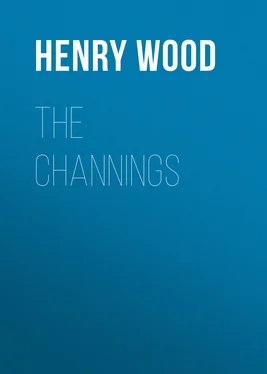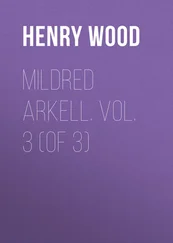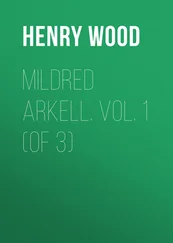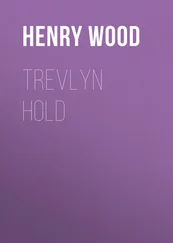Henry Wood - The Channings
Здесь есть возможность читать онлайн «Henry Wood - The Channings» — ознакомительный отрывок электронной книги совершенно бесплатно, а после прочтения отрывка купить полную версию. В некоторых случаях можно слушать аудио, скачать через торрент в формате fb2 и присутствует краткое содержание. Жанр: foreign_sf, literature_19, на английском языке. Описание произведения, (предисловие) а так же отзывы посетителей доступны на портале библиотеки ЛибКат.
- Название:The Channings
- Автор:
- Жанр:
- Год:неизвестен
- ISBN:нет данных
- Рейтинг книги:4 / 5. Голосов: 1
-
Избранное:Добавить в избранное
- Отзывы:
-
Ваша оценка:
- 80
- 1
- 2
- 3
- 4
- 5
The Channings: краткое содержание, описание и аннотация
Предлагаем к чтению аннотацию, описание, краткое содержание или предисловие (зависит от того, что написал сам автор книги «The Channings»). Если вы не нашли необходимую информацию о книге — напишите в комментариях, мы постараемся отыскать её.
The Channings — читать онлайн ознакомительный отрывок
Ниже представлен текст книги, разбитый по страницам. Система сохранения места последней прочитанной страницы, позволяет с удобством читать онлайн бесплатно книгу «The Channings», без необходимости каждый раз заново искать на чём Вы остановились. Поставьте закладку, и сможете в любой момент перейти на страницу, на которой закончили чтение.
Интервал:
Закладка:
“I think you ought to ask eighty,” said Arthur.
“So I would, if I were thirty-one instead of twenty-one,” said Constance. “Oh dear! here am I, laughing and joking over it, but it is a serious thing to undertake—the instruction of the young. I hope I shall be enabled to do my duty in it. What’s that?”
It was a merry, mocking laugh, which came from the outside of the window, and then a head of auburn hair, wild and entangled, was pushed up, and in burst Annabel, her saucy dark eyes dancing with delight.
“You locked me out, but I have been outside the window and heard it all,” cried she, dancing before them in the most provoking manner. “Arthur can only be a paid clerk, and Constance is going to be a governess and get forty guineas a year, and if Tom doesn’t gain his exhibition he must turn bell-ringer to the college, for papa can’t pay for him at the university now!”
“What do you deserve, you wicked little picture of deceit?” demanded Hamish. “Do you forget the old story of the listener who lost his ears?”
“I always do listen whenever I can, and I always will,” avowed Annabel. “I have warned you so a hundred times over, and now I warn you again. I wish Tom would turn bell-ringer! I’d make him ring a peal that should astonish Helstonleigh, the day Constance goes out as governess. Shan’t I have a fine time of it! It’s lessons for me now, morning, noon, and night,—she’s always worrying me; but, once let us get her back turned, and I shall have whole holiday! She may think I’ll do my lessons with her at night; but I won’t!”
The boys began to chase her round the table. She was almost a match for all four—a troublesome, indulged, sunny-hearted child, who delighted in committing faults, that she might have the pleasure of avowing them. She flew out into the garden, first knocking over Constance’s paint-box, and some of them went after her.
At that moment Mr. Yorke came in. You have seen him once before, in his place in Helstonleigh Cathedral: a tall, slender man, with pale, well-formed features, and an attractive smile. His dark eyes rested on Constance as he entered, and once more the brilliant colour lighted up her face. When prospects should be a little better—that is, when Mr. Yorke should have a sufficient living bestowed upon him—Constance was to become his wife. His stipend from the minor canonry was at present trifling.
“Judith met me in the hall as I was going into the parlour, and told me I had better come here,” he observed. “She said bad news had arrived for Mr. Channing.”
“Yes,” answered Hamish. “The lawsuit is lost.”
“Lost!” echoed Mr. Yorke.
“Irrevocably. We were discussing ways and means amongst ourselves,” said Hamish, “for of course this changes our prospects materially.”
“And Constance is going out as a governess, if she can find any one to take her, and Arthur is to plod on with Joe Jenkins, and Tom means to apply for the post of bell-ringer to the cathedral,” interposed the incorrigible Annabel, who had once more darted in, and heard the last words. “Can you recommend Constance to a situation, Mr. Yorke?”
He treated the information lightly; laughed at and with Annabel; but Constance noticed that a flush crossed his brow, and that he quitted the subject.
“Has the inked surplice been found out, Tom,—I mean the culprit?”
“Not yet, Mr. Yorke.”
“Charles, you can tell me who it was, I hear?”
There was a startled glance for a moment in Charles’s eye, as he looked up at Mr. Yorke, and an unconscious meaning in his tone.
“Why, do you know who it was, sir?”
“Not I,” said Mr. Yorke. “I know that, whoever it may have been deserves a sound flogging, if he did it willfully.”
“Then, sir, why do you suppose I know?”
“I met Hurst just now, and he stopped me with the news that he was sure Charley Channing could put his hand upon the offender, if he chose to do it. It was not yourself, was it Charley?”
Mr. Yorke laughed as he asked the question. Charley laughed also, but in a constrained manner. Meanwhile the others, to whom the topic had been as Sanscrit, demanded an explanation, which Mr. Yorke gave, so far as he was cognizant of the facts.
“What a shame to spoil a surplice! Have you cause to suspect any particular boy, Charley?” demanded Hamish.
“Don’t ask him in my presence,” interrupted Tom in the same hurried manner that he had used in the cloisters. “I should be compelled in honour to inform the master, and Charley would have his life thrashed out of him by the school.”
“Don’t you ask me, either, Mr. Yorke,” said Charles; and the tone of his voice, still unconsciously to himself, bore a strange serious earnestness.
“Why not?” returned Mr. Yorke. “I am not a senior of the college school, and under obedience to its head-master.”
“If you are all to stop in this room, I and Tom shall never get our lessons done,” was all the reply made by Charles, as he drew a chair to the table and opened his exercise books.
“And I never could afford that,” cried Tom, following his example, and looking out the books he required. “It won’t do to let Huntley and Yorke get ahead of me.”
“Trying for the seniorship as strenuously as ever, Tom?” asked Mr. Yorke.
“Of course I am,” replied Tom Channing, lifting his eyes in slight surprise. “And I hope to get it.”
“Which of the three stands the best chance?”
“Well,” said Tom, “it will be about a neck-and-neck race between us. My name stands first on the rolls of the school; therefore, were our merits equal, in strict justice it ought to be given to me. But the master could pass me over if he pleased, and decide upon either of the other two.”
“Which of those two stands first on the rolls?”
“Harry Huntley. Yorke is the last. But that does not count for much, you know, Mr. Yorke, as we all entered together. They enrolled us as our initial letters stood in the alphabet.”
“It will turn wholly upon your scholastic merits, then? I hear—but Helstonleigh is famous for its gossip—that in past times it has frequently gone by favour.”
“So it has,” said Tom Channing, throwing back his head with a whole world of indignation in the action. “Eligible boys have been passed over, and the most incapable dolt set up above them; all because his friends were in a good position, and hand-in-glove with the head-master. I don’t mean Pye, you know; before he came. It’s said the last case was so flagrant that it came to the ears of the dean, and he interfered and forbade favour for the future. At any rate, there’s an impression running through the school that merit and conduct, taken together, will be allowed fair play.”
“Conduct?” echoed Arthur Channing.
Tom nodded:—“Conduct is to be brought in, this time. One day, when the first desk fell into a row with the head-master, through some mischief we had gone into out of school, he asked us if we were aware that our conduct, as it might be good or ill, might gain or lose us the seniorship. Yorke, who is bold enough, you know, for ten, remarked that that was a new dodge, and the master overheard the words, and said, Yes, he was happy to say there were many new ‘dodges’ he had seen fit to introduce, which he trusted might tend to make the school different from what it had been. Of course we had the laugh at Yorke; but the master took no more notice of it. Since then, I assure you, Mr. Yorke, our behaviour has been a pattern for young ladies—mine, and Huntley’s, and Yorke’s. We don’t care to lose a chance.”
Tom Channing nodded sagaciously as he concluded, and they left the room to him and Charles.
CHAPTER IV. – NO HOLIDAY TO-DAY
Интервал:
Закладка:
Похожие книги на «The Channings»
Представляем Вашему вниманию похожие книги на «The Channings» списком для выбора. Мы отобрали схожую по названию и смыслу литературу в надежде предоставить читателям больше вариантов отыскать новые, интересные, ещё непрочитанные произведения.
Обсуждение, отзывы о книге «The Channings» и просто собственные мнения читателей. Оставьте ваши комментарии, напишите, что Вы думаете о произведении, его смысле или главных героях. Укажите что конкретно понравилось, а что нет, и почему Вы так считаете.












